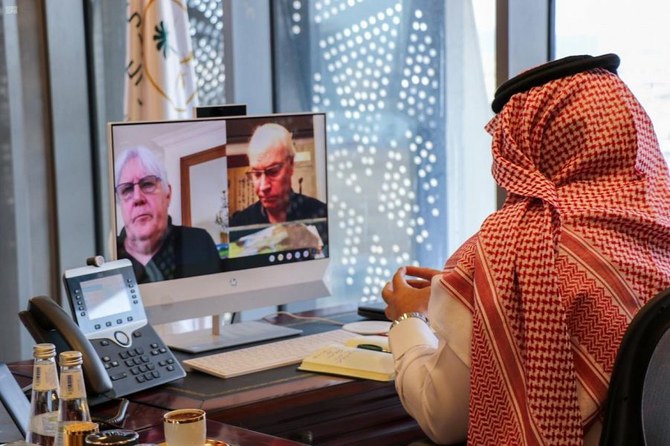LONDON: A Houthi militia assault on the Yemeni government’s last northern stronghold must stop, the UN envoy to the country said Thursday, warning of a potential humanitarian disaster.
“It puts millions of civilians at risk, especially with the fighting reaching camps for internally displaced persons,” envoy Martin Griffiths told the UN Security Council by video conference, of the attack on the city of Marib.
“The quest for territorial gain by force threatens the prospects of the peace process.”
Griffiths said he sees “common ground for agreement” between the Houthis and the internationally recognized government to end the conflict. “But there is nothing anybody can do to force the warring parties to peace, unless they choose to put down the guns and talk to each other,” he said.
Griffiths to #UNSC: "As a mediator, I persuade, facilitate &encourage dialogue
But there is nothing anybody can do to force the warring parties into peace unless they choose to put down the guns &talk to each other. The responsibility to end the war lies with the parties"— @OSE_Yemen (@OSE_Yemen) February 18, 2021
“I want to emphasize what is at stake,” he said. “The military situation in the country is extremely tense” — more so than at any time during his three years as Secretary-General Antonio Guterres’ special representative to Yemen.
“Over the past month, the conflict in Yemen has taken a sharp escalatory turn,” he said, adding that civilians are bearing the brunt of hostilities and pointed to “shocking violations” of international humanitarian law.
Along with the Marib fighting, Griffiths said there have been “worrying spikes of violence and hostilities” in the provinces of Hodeidah, where a key port is located, and the government-held Taiz.
Cross-border attacks into Saudi Arabia, blamed on the Houthis and their supporters, “damage prospects for peace and regional stability,” Griffiths told council members.
He welcomed President Joe Biden’s renewed focus on ending Yemen’s war and the appointment of a new US special envoy, Timothy Lenderking.
“This offers us new opportunity to reopen space for a negotiated solution,” he said. “To seize this chance to revitalize the political process, the parties should immediately agree to a nationwide cease-fire.”
He said he will continue engaging the parties “on the path forward, and I hope they will demonstrate the will to make progress.”
Large-scale famine is looming in Yemen.
Watch live as @UNReliefChief briefs the UN Security Council on the humanitarian situation in Yemen.
10 AM ESThttps://t.co/iXlktWH9IQ
— UN Humanitarian (@UNOCHA) February 18, 2021
The Houthis this month resumed their offensive to seize oil-rich Marib, some 120 kilometers (75 miles) east of the capital Sanaa, which was seized by the Iran-backed militia in 2014..
The city’s loss would be a major blow for Yemen’s government but would also threaten catastrophe for civilians, including hundreds of thousands of displaced people sheltering in desolate camps in the region.
“To seize this chance to revitalize the political process, the parties should immediately agree to a nationwide cease-fire that halts all forms of fighting,” Griffiths said.
On a positive note, Griffiths said negotiations between the two sides on a second release of prisoners and detainees have been taking place in Amman, Jordan for the past three weeks.
“We’re not quite there yet,” he said, urging the parties to successfully conclude negotiations. “And I call for the immediate and unconditional release of all sick, wounded, elderly and children detainees as well as all arbitrarily detained civilians including women and journalists.”
Also briefing the Security Council, UN aid chief Mark Lowcock appealed for about $4 billion in 2021 to fund humanitarian operations, warning that “Yemen is speeding toward the worst famine the world has seen in decades.” Lenderking this week also urged the Houthis to halt their advance.
Lowcock then warned: “There’s an important opportunity right now to help Yemen move toward lasting peace ... but that opportunity will disappear, it will be wasted, if Yemen tips into a massive famine.”
Yemen is speeding towards the worst famine the world has seen in decades.
Children are already starving to death.
The world needs to take action now. Read my statement here:https://t.co/ig9aLY2xjF
— Mark Lowcock (@UNReliefChief) February 18, 2021
The assault could “push an already stretched humanitarian infrastructure beyond the breaking point,” Lenderking told reporters in Washington after a trip to the region.
The toll from the battle for Marib is unknown, but there are reports of hundreds dead.
Until early 2020, Marib had been spared the worst of Yemen’s six-year-old conflict, and became a sanctuary for many.
On Thursday, Griffiths also met with Saudi Arabia’s ambassador to Yemen Mohammed bin Saeed Al-Jaber to discuss the Houthi militia’s attacks on civilian facilities in the Kingdom, as well as the group’s ongoing offensive Marib, despite international calls for peace.
Al-Jaber affirmed the Kingdom’s support for UN efforts to reach a comprehensive political solution to the war in Yemen.
(With AP, AFP and Reuters)





























